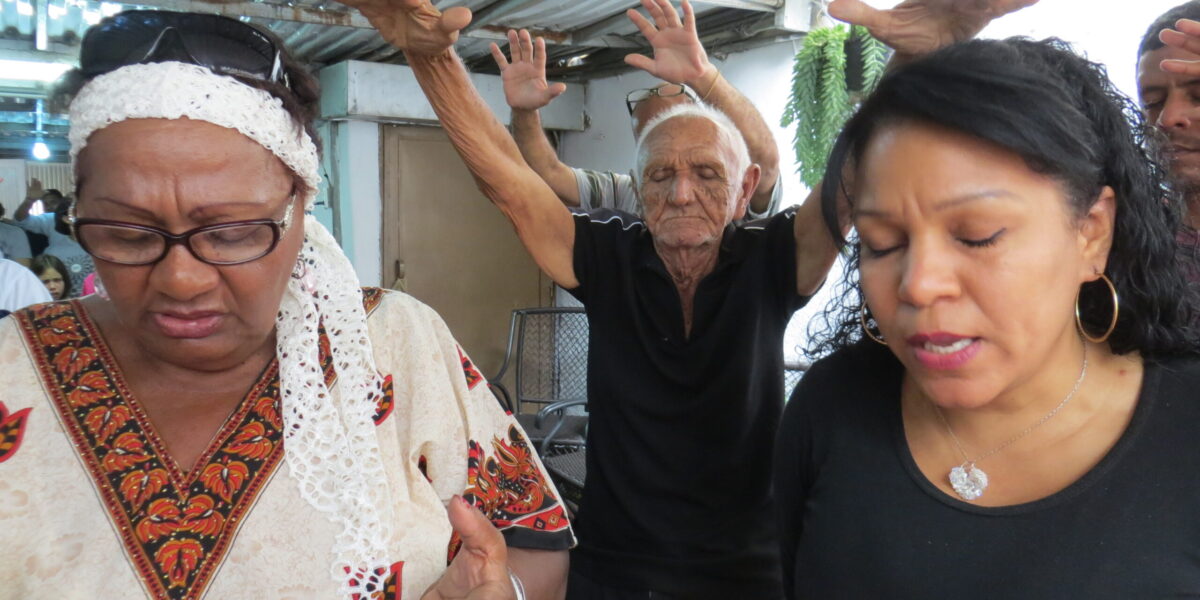ELKHART, INDIANA (Mennonite Mission Network) – Despite national chaos, Anabaptists in Venezuela have not been deterred in sharing the love of Christ in their communities and with one another. In the first gathering of its kind, members of Iglesia Evangélica Menonita de Oriente (Evangelical Mennonite Church of the East) in Venezuela came together Mar. 23-25 from the three different regions – Caracas, Yaracuy, and Isla Margarita. In an effort to support and learn from one another, each region shared about the life and work of their churches in these troubled times.
According to Reuters report, Nicolas Maduro’s presidency has been denounced by many, since he took power in 2013, for its lack of democratic rule, corruption, and the resulting medicinal and food shortages. Currently, Venezuela’s deteriorating economy and political instability have motivated its citizens to again rally in the streets. On Apr. 19, hundreds of thousands of Venezuelans demonstrated in what was called the "mother of all protests." Almost every day since then, citizens have continued to march.
Believers from Caracas spoke of their food sharing ministry called Dale la Mano al Prójimo (Give a hand to your neighbor). They offer coffee and empanadas or arepas, made from ingredients they are able to acquire that week, to people living on the street. Following this act of compassion, eight people from this ministry have begun participating in their Sunday services. Their church services are also followed by a simple meal.
They also try to show Christ’s love in everyday experiences, such as by offering chairs to the elderly while they wait in lines to buy the government rationed food.
Erwin Mirabal, president of the Iglesia Evangélica Menonita de Oriente conference, describes these ministries as creating ways for people to trust God rather than giving their loyalties to a certain political party or ideology.
One ministry that has proven to be an important form of outreach, as well as a tool to strengthen local congregations, has been seminary classes. Not all students are church members; some enter eager to learn what the Bible says and later become convinced of its message. This semester, 50 students were enrolled in classes. Fourteen completed coursework to receive certificates as "pastoral encouragers."
Jesus’ teaching is central in the seminary classes, as it is in the Anabaptist churches, and the Sermon on the Mount is a key text used in classes they share with other churches.
Euclides Bauza, seminary coordinator on Isla Margarita, shared that while many people are familiar with the Sermon on the Mount, Mirabal’s way of teaching this as a message for today has inspired new responses.
"On Isla Margarita, many of the churches that are receiving these classes have been established for a long time," Bauza said. "But when they study the Sermon on the Mount with us, it’s like their eyes are opened; scales fall from their eyes."
Maria Elena Rodríguez added, "Sometimes I become timid in the face of other evangelicals’ certainties because the Sermon on the Mount sometimes crashes against the chest when you first hear it. But when you taste this message, you begin to become more confident and secure in proclaiming it."
"That is why we need to penetrate the neighborhoods of the city," Mirabal explained. "The church cannot be an intellectual ghetto."
Ministering to neighborhood children was another priority for all the congregations, which have projects that entail literacy and school work assistance to vacation Bible school and more.
On Isla Margarita, the church has official permission to teach cooperative games in the public schools. The same model is being prepared to be replicated in schools in Caracas. Through this practice, they hope to help children learn how to work together, and learn the value of cooperation rather than competition, even in the midst of shortages.
The three-day retreat uplifted believers through stories of these ministries and the opportunity to know one another. Travel in Venezuela is difficult, and for many it was the first time they had met brothers and sisters from the other regions in-person.
Also present to encourage the developing network of Mennonite congregations was David Boshart, executive conference minister of Central Plains Mennonite Conference; Linda Shelly, director for Latin America from Mennonite Mission Network; and Peter Stucky and Oscar Herrera of the mission committee of Iglesia Cristiana Menonita de Colombia (Colombia Mennonite Church), representing the three entities involved in this partnership with the Venezuelan churches.
Stucky led a Bible study on the religious and political leadership groups in the New Testament, and contrasted these groups with the type of leadership that Jesus taught and demonstrated. The study asked the participants to consider their cultural, social and political contexts, and encouraged them in their work of the church in Venezuela today.
The gathering concluded their time together with communion and hand-washing.
"Washing each other’s hands was meaningful, and I noted especially the adults who lovingly included the children in this ceremony," observed Shelly.
Boshart added, "The birth of this network can only be described as the movement of God’s Sprit among people who are seeking to take the teaching of Jesus seriously."







